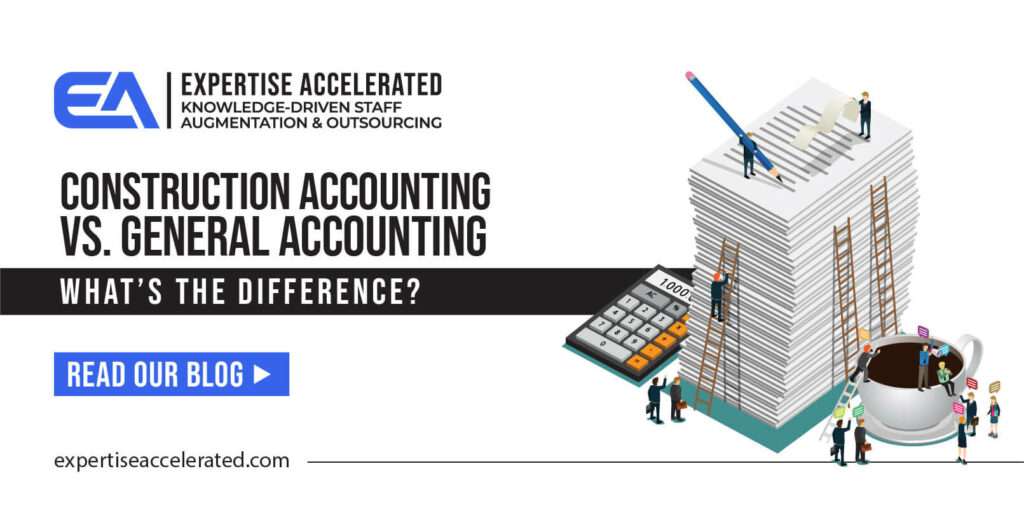Comprehending the Significance of Construction Audit for Effective Task Management

Duty of Building And Construction Audit
Building accountancy functions as the backbone of economic monitoring in the building and construction sector, making sure that tasks are completed within budget and monetary purposes are met. construction accounting. This specific accounting method addresses the one-of-a-kind obstacles faced in construction tasks, including differing job periods, rising and fall prices, and multiple stakeholders
Among the main functions of building and construction accounting is to provide precise cost estimate and monitoring throughout the job lifecycle. This facilitates informed decision-making, allowing project managers to adjust resources and timelines effectively. In addition, building and construction accounting enhances capital management by monitoring accounts payable and receivable, therefore ensuring that funds are available for timely settlements to providers and subcontractors.
In addition, building and construction audit help in compliance with industry regulations and coverage demands. It outfits task managers with the necessary economic data to prepare detailed financial declarations, which are crucial for audits and monetary evaluations. By maintaining clear records, construction accountancy promotes transparency and liability, vital components in building trust fund among stakeholders. Inevitably, the role of construction accountancy extends past plain economic tracking; it is indispensable to critical preparation and functional efficiency, driving the success of building and construction tasks in a competitive landscape.
Key Components of Construction Audit

Budgeting establishes a financial structure that overviews job implementation, enabling supervisors to assign resources successfully and anticipate prospective monetary obstacles. Accurate expense monitoring is crucial for monitoring costs in real-time, assisting to recognize variations in between forecasted and actual prices. This makes it possible for timely changes to maintain the project on budget.
In addition, monetary reporting offers stakeholders with a clear image of the job's monetary wellness. Normal reports, such as earnings and loss statements and cash flow evaluations, facilitate informed decision-making and boost transparency among all celebrations involved.
Additionally, conformity with industry policies and bookkeeping requirements is essential. This guarantees that monetary methods are not only effective but additionally lawful, guarding the company versus lawful effects. By integrating these key parts, construction bookkeeping promotes an organized method to managing economic sources, inevitably adding to the successful completion of construction tasks.
Advantages for Task Supervisors
Leveraging reliable building and construction accountancy methods gives job supervisors with a wide range of benefits that boost both functional performance and economic oversight. One substantial benefit is enhanced spending plan administration. Exact tracking of profits and expenses enables project managers to keep an eye on economic efficiency in actual time, making sure tasks stay within budget plan and facilitating timely changes when needed.
Moreover, construction accounting enhances capital administration, enabling project managers to anticipate monetary demands and enhance resource appropriation. By recognizing cash money inflows and discharges, they can better take care of payments to subcontractors, providers, and staff members, therefore staying clear of expensive hold-ups.
Furthermore, durable audit systems supply thorough coverage capacities. Job managers can produce reports that use insights into project earnings, expense variations, and source use. This data-driven approach promotes informed decision-making, permitting managers to determine possible issues proactively and execute rehabilitative actions.
Last but not least, adherence to building accountancy criteria ensures compliance with governing and lawful requirements, lessening the danger of charges or conflicts. In general, efficient building and construction bookkeeping furnishes project managers with the devices necessary to drive job success, boost stakeholder confidence, and advertise long-lasting organizational development.
Typical Obstacles in Building And Construction Audit
Several project supervisors encounter significant challenges in building accounting that can prevent project success. Among the main difficulties is the complexity of tracking several job sites, news each with distinctive budget plans, timelines, and resource allowances. This needs meticulous focus to detail, which can be frustrating without a durable accounting system in position.
Additionally, varying product expenses and labor rates can complicate budget plan management, making precise forecasting challenging. Project managers often have a hard time to fix up these expenses with real expenditures, bring about possible financial disparities.
Furthermore, construction audit involves compliance with numerous policies, consisting of tax responsibilities and labor laws. Navigating these regulations can be difficult, specifically for supervisors who might not have a strong accounting history.
An additional substantial obstacle is managing capital, which is important in the building sector. Hold-ups in invoicing, payments from clients, or unanticipated task adjustments can create capital lacks, endangering the job's progress.
Lastly, reliable interaction in between job supervisors, accountants, and field groups is crucial. Misconceptions can lead to inaccurate economic reporting, further complicating project monitoring efforts. Dealing with these obstacles proactively is essential for effective building accounting.

Finest Practices for Effective Audit
While browsing the complexities of building and construction accounting can be difficult, taking on best methods can considerably enhance financial monitoring and job success. One essential practice is maintaining timely and exact records. Carrying out robust audit software program tailored to building and construction jobs can enhance information access, invoicing, and coverage, conserving and lowering errors time.
Additionally, establishing a clear spending plan and normal tracking against this budget are vital. Using a system of regular economic testimonials enables job managers to determine differences early, assisting in prompt decision-making. It is also important to different job costs right into indirect and straight classifications, allowing clearer understandings into earnings.
Another best practice includes fostering open interaction amongst all stakeholders. Routine updates and collaborative discussions about financial condition can make certain every person is aligned and informed. Training staff in construction-specific audit concepts better enhances competency and precision.
Finally, making sure compliance with pertinent bookkeeping requirements and regulations is non-negotiable. Normal audits and internal testimonials add to openness and liability, building link count on with customers and stakeholders. By concentrating on these best methods, building and construction firms can enhance their accounting processes, eventually driving task success and economic stability.
Final Thought
Finally, construction bookkeeping plays a crucial role in making certain effective task management by helping with precise financial oversight and improving decision-making. By integrating crucial elements such as cost evaluation, money flow administration, and compliance, project managers can navigate common challenges and take advantage of ideal techniques for reliable accountancy. Ultimately, a robust building bookkeeping framework not only safeguards browse around these guys budget honesty yet additionally adds to the total financial health of construction tasks, cultivating lasting success within the sector.
By incorporating these crucial elements, construction bookkeeping promotes a structured technique to managing economic sources, inevitably adding to the effective completion of building and construction projects.
Accurate tracking of profits and costs allows job managers to monitor economic performance in real time, guaranteeing projects stay within budget and facilitating prompt changes when required.
Task managers can generate records that use insights right into project productivity, price variations, and resource use.Numerous task managers experience substantial difficulties in construction accountancy that can hinder task success. construction accounting. Eventually, a robust building audit framework not just safeguards budget plan honesty however additionally contributes to the total financial health and wellness of building tasks, promoting lasting success within the sector